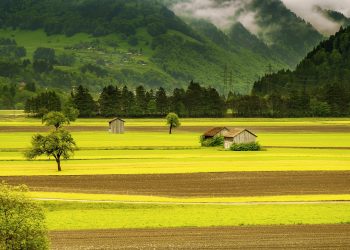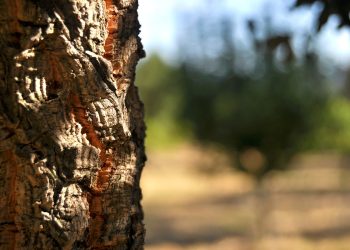In Ghana, local scientists from the Savanna Agricultural Research Institute (SARI) of the Council for Scientific and Industrial Research (CSIR) have employed biotechnology to develop two crops: nitrogen- and water-use-efficient (NEWEST) rice and the genetically modified cowpea, also known as the pod borer-resistant (PBR) cowpea.
Neither of these crops are commercialized yet, though they have gone through various stages of evaluation and field trials. Currently, an application submitted by SARI on the PBR cowpea awaits approval from the National Biosafety Authority. The Authority, which was set up after Ghana passed the Biosafety Act (831) in 2011, is the country’s GMO regulatory body.
In a recent interview, Dr. Daniel Osei Fosu, research scientist with the Biotechnology and Nuclear Agricultural Institute (BNARI) of the Ghana Atomic Energy Commission (GAEC), explained the concept of GMOs in simple terms. He said that GMO development is a process that relies on age-old knowledge strengthened by new knowledge. Better understanding of DNA — the genetic information carrier in living things — has led to the discovery that scientists can use the knowledge to help solve problems associated with some organisms.
Across 16 regions in Ghana, farmers shared diverse views reflecting how much they understand and need the technology. Sabina Agyei and Vida Dzortu, both maize farmers, lost large portions of their farms to the fall armyworm invasion five years ago. More than 20,000 hectares of farmland across the country were destroyed, causing an economic loss of some US$64 million. They described the situation as disturbing.
Suggesting ways to avoid such unfortunate instances, Dzortu advised the consideration of GM crops, though she admits that farmers need more education. “I hear many people say GM seeds are made from rubber, but I do not want to believe it, because if it was, it would never germinate,” she said, sharing a piece of common misinformation. “If it germinates, then it’s a good seed.”
GM maize is enhanced with inherent disease-resistant genes that have the potential to withstand the harmful effects of pests, including the fall armyworm, according to research scientists attached to the Biotechnology Research Program (BRP) of the Crop Research Institute (CRI). It also has drought-tolerant qualities but still requires adequate soil nutrients and fertilization for optimum yield.
“I know some countries consume GMOs and there’s nothing happening to them, so why can’t we also do same?” Dzortu quizzed. She added that dealing with the fall armyworm is devastating and wearisome and requires lots of chemicals.
Sign the petition to support approval of GM cowpea in Ghana
Agya Sei, who is in his 50s, cultivates cassava, plantain, maize and cocoa. He often battles with pests and believes farmers need pest-resistant varieties. “Our mothers used to produce a lot because there weren’t much pests or fall armyworm or climate challenges, I wish it was same with us.” However, he doesn’t think farmers need GMOs because of the stories he often hears about the technology. But if the narrative changes, he said he will be ready to accept the technology.
“As you know, times change. You see, before we were against pesticides and weedicides because there was a lot of noise on it suggesting it wasn’t good. But now that’s what we are using on our farms. If our leaders will give us the needed education on this technology to appreciate it and know it’s going to be rather helpful after all, we will adopt it,” he concluded.
Conventional cowpea is typically sprayed 8 to 12 times in its 3-month cycle, but the PBR cowpea reduces it to only twice per season. This will drastically reduce chemical usage on cowpea farms, which will protect the health of farmers and consumers as well as the environment. Yields will also be increased.
A previous study conducted by the CSIR-Science and Technology Policy Research Institute (STEPRI) and the Food and Drugs Authority (FDA) suggested that a large percentage of the public is either ignorant of the technology and GM products or has little knowledge. Their perception of whether a product is genetically modified often depends on whether the product is mainly imported or locally produced.
The same study also established that the government and the media are not carrying out enough education on the subject.
Citrus and potato farmer Emmanuel Amponsah said in an interview that he believes scientists have allowed politicians to take the lead in communicating the science and misinforming the public.
“GMOs aren’t bad,” he said. “The problem is our scientists are not talking much about it and the politicians are the ones causing all the fear-mongering. They [scientists] have allowed themselves to be overshadowed by the politicians who continuously vilify the technology. I believe commercializing GMOs will be economically gainful to us farmers. If other countries growing GM pawpaw and the likes are benefitting economically, why can’t Ghana also do it?”
Anti-GMO organizations often claim that farmers will come to depend on GM seed suppliers and companies and will be required to purchase new seeds for every planting season, thus denying them the rights to use stored seeds. Dr. Samuel Amiteye, a scientist with BNARI, said that buying new or original hybrid seeds has always been a practice in conventional farming methods to achieve maximum yield. Hybrid seeds period will segregate over time and farmers are not likely to get the expected yield. He noted that hybrid GM seeds also go through the same process and cautioned against sidelining GM crops.
“We can ignore GMOs alright and go through a process where farmers continuously replant seeds of plants they find with desired traits. After some 20 to 25 years, farmers may have the ideal varieties they want. But why wait for that long when we can do it now?” he quizzed.
The PBR cowpea is enhanced to protect itself against the pod borer pest (Maruca vivatra) and other parasitic weeds such as striga and alectra, hence limiting pesticide use and increasing yields. Nigeria was the first country to approve and commercialize the GM cowpea in 2019 and farmers who grow the variety are reporting 20 percent yield increase.
If the PBR cowpea is commercialized in Ghana, it could add up to US$31 million production value cumulative over six years to the existing annual production value of US$55 million, according to a 2019 predictive economic study by the Institute of Statistical, Social and Economic Research (ISSER) at the University of Ghana, in collaboration with the International Food Policy Research Institute (IFPRI-Ghana) and the Science and Technology Policy Research Institute (STEPRI-Ghana). However, if the regulatory process delayed the introduction of the new cowpea to 2024, Ghana stood to lose US$20 million.
As a regulator, the National Biosafety Authority ensures that GM crops undergo stringent and rigorous processes throughout all stages of its development and commercialization to guarantee safety for the producer, consumer and environment. It also regulates contained use, confined field trials, release, market placement and transit of GMOs.
“The basic principle of biosafety is, if it is not safe, it shouldn’t leave the lab,” Fosu said. “Before you even begin to move DNA in the lab, you will need a permit from your country’s regulator and then you will have to meet the requirements at each stage of your work before the organism developed can be screened and subjected to a confined field trial test.” Scientific data, socio-economic implications and general public views are also key in considering release of GMOs, he added.
Ama Kudom-Agyeman, a consultant to the NBA, explained that the agency is working with other credible institutions to ensure GMOs are rightly regulated. These institutions include the FDA, Ghana Standards Authority, Council for Scientific and Industrial Research and the Customs and the Crop Research Institute.
“The NBA as a regulatory agency has put in place all needed mechanisms to ensure things are done properly. Their framework has even been adopted by other countries and so we can’t doubt their credibility,” she said.
As part of the PBR cowpea regulatory review, the NBA is inviting public comments to make a final decision on the request by SARI. The public can send an email to this effect to info@nba.org or post to “The CEO, NBA, P.O. Box WY 669, Kwabenya-Accra.” A petition can also be signed to support the approval.
BY DENNIS BAFFOUR-AWUAH
O artigo foi publicado originalmente em Cornell Alliance for Science.















































